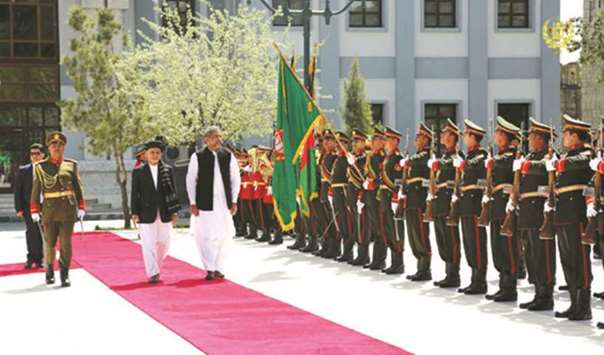The leaders of Pakistan and Afghanistan promised to work together on regional security in a face-to-face meeting yesterday, one day after Kabul accused the Pakistani military of carrying out a rare air strike on its side of the border.
Afghanistan on Thursday accused Pakistan of strikes causing “huge financial damages” in a province bordering Pakistan.
Pakistan responded that its security forces were countering Afghan-based militant groups on its own side of the border.
The row highlighted long-standing mistrust between the neighbours that centres on mutual accusations that the other country does not adequately prevent cross-border militant attacks.
But yesterday’s previously scheduled visit by Pakistan Prime Minister Shahid Khaqan Abbasi to Afghan President Ashraf Ghani in Kabul included “cordial and friendly” talks, Abbasi’s office said in a statement.
It said that the leaders agreed on a common aim of regional security.
Ghani, in a statement, said he raised the issue of border violations with Abbasi and stressed that the situation was not helpful to either side.
The leaders decided that their national security advisers would prepare a joint action plan for peace and reconciliation in Afghanistan, according to a statement from the Afghan presidential palace.
“Both sides agreed the national security advisers will finalise [an] Afghanistan-Pakistan action plan,” the statement quoted Ghani as saying at the meeting with Abbasi.
The statement did not mention what the plan would look like and how the Taliban would be persuaded to initiate talks to end the war, which is now in its 17th year.
A day earlier, Afghanistan alleged that Pakistan jets had dropped four bombs in the Afghan border province of Kunar, and warned that such strikes could damage relations.
Such an incident is a rare departure from the norm of cross-border shelling, said Thomas Ruttig, co-director of Afghanistan Analysts Network.
However, Ruttig said that it did not appear to damage relations greatly, since Ghani did not cancel the meeting.
The strikes did not cause any deaths or injuries, said Faridullah Dehqan, spokesman for Kunar police.
Afghanistan’s Western-backed government has long accused Pakistan of harbouring Afghan Taliban insurgents, a charge that Islamabad denies.
Islamabad, in turn, accuses Afghanistan of not doing enough to eradicate Pakistani Taliban militants, many of whom are based in Afghanistan and mostly carry out attacks inside Pakistan.
A surge in efforts by the United States and regional powers like Russia and China to seek an end to the war has apparently prompted Pakistan into a rapprochement with Kabul.
The visit, the first by a Pakistani prime minister in three years, comes weeks after a Russia-supported international conference in the Uzbek city of Tashkent called upon the Taliban to renounce violence.
Earlier in February, Ghani offered the Taliban an unconditional peace overture at an international conference in Kabul attended by the US and key European nations.
“We believe things will start moving ahead after this meeting,” a Pakistani diplomat told DPA.
The Afghan Taliban has been expanding its military offensives since the end of the North Atlantic Treaty Organisation (Nato) combat mission in December 2014.
They are now estimated to control or have influence over at least 14% of the country, while another 30% is still being fought over.

President Ghani and Prime Minister Abbasi inspect the honour guard at the presidential palace in Kabul.
